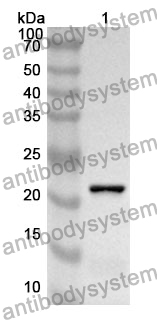Catalog No.
PHC27301
Species reactivity
Human
Host species
Rabbit
Isotype
IgG
Clonality
Polyclonal
Immunogen
E. coli - derived recombinant Human CTSL (Ala114-Thr288).
Tested applications
ELISA: 1:4000-1:8000, IHC: 1:50-1:100, WB: 1:1000-1:4000
Target
CTSL1,MEP,Procathepsin L,Major excreted protein,Cathepsin L1,CTSL
Purification
Purified by antigen affinity column.
Accession
P07711
Applications
ELISA, IHC, WB
Form
Liquid
Storage buffer
0.01M PBS, pH 7.4, 50% Glycerol, 0.05% Proclin 300.
Stability and Storage
Use a manual defrost freezer and avoid repeated freeze thaw cycles. Store at 2 to 8°C for frequent use. Store at -20 to -80°C for twelve months from the date of receipt.
Effective extracellular payload release and immunomodulatory interactions govern the therapeutic effect of trastuzumab deruxtecan (T-DXd)., PMID:40175391
Proteogenomic analysis integrated with electronic health records data reveals disease-associated variants in Black Americans., PMID:39316441
The protease inhibitor E64d might attenuate the development of experimental anti-glomerular basement membrane disease through regulating the activation of Th1 cells., PMID:38295547
Nanoengineered Red Blood Cells Loaded with TMPRSS2 and Cathepsin L Inhibitors Block SARS-CoV-2 Pseudovirus Entry into Lung ACE2+ Cells., PMID:38194699
The Serum ACE2, CTSL, AngII, and TNFα Levels after COVID-19 and mRNA Vaccines: The Molecular Basis., PMID:38137381
Involvement of cathepsin L in the degradation and degeneration of postovulatory follicle of the medaka ovary†., PMID:37712895
Lysosome blockade induces divergent metabolic programs in macrophages and tumours for cancer immunotherapy., PMID:37537587
Neurobiochemical, Peptidomic, and Bioinformatic Approaches to Characterize Tauopathy Peptidome Biomarker Candidates in Experimental Mouse Model of Traumatic Brain Injury., PMID:36635478
Identification of immune cell infiltration and diagnostic biomarkers in unstable atherosclerotic plaques by integrated bioinformatics analysis and machine learning., PMID:36211422
XPA is susceptible to proteolytic cleavage by cathepsin L during lysis of quiescent cells., PMID:34883264
BSG/CD147 and ACE2 receptors facilitate SARS-CoV-2 infection of human iPS cell-derived kidney podocytes., PMID:34816259
Role of major histocompatibility complex II antigen-presentation pathway genes in orange-spotted grouper infected with Cryptocaryon irritans., PMID:32924190
Targeting COVID-19 in Parkinson's Patients: Drugs Repurposed., PMID:32881656
A humanized antibody inhibitor for cathepsin L., PMID:32683733
Arsenic induces mTOR-dependent autophagy, whereas it impairs the autophagy-lysosome pathway and the potential role of TFEB in cultured dendritic cells., PMID:32519707
Cathepsin L promotes angiogenesis by regulating the CDP/Cux/VEGF-D pathway in human gastric cancer., PMID:32388635
C-terminal α-synuclein truncations are linked to cysteine cathepsin activity in Parkinson's disease., PMID:31092553
Cathepsin L promotes secretory IgA response by participating in antigen presentation pathways during Mycoplasma Hyopneumoniae infection., PMID:30986254
Cellular proliferation in mouse and human pancreatic islets is regulated by serpin B13 inhibition and downstream targeting of E-cadherin by cathepsin L., PMID:30824970
A review of candidate therapies for Middle East respiratory syndrome from a molecular perspective., PMID:28855003
Decreased expression of thymus-specific proteasome subunit β5t in Down syndrome patients., PMID:25556590
Identification and characterization of the interactive proteins with cytotoxic T-lymphocyte antigen-2α., PMID:25514977
Cathepsin L plays a role in quinolinic acid-induced NF-Κb activation and excitotoxicity in rat striatal neurons., PMID:24073275
Cathepsin L protects mice from mycoplasmal infection and is essential for airway lymphangiogenesis., PMID:23600672
Degradation of troponin I in serum or plasma: mechanisms, and analytical and clinical implications., PMID:22422336
Cathepsin L derived from skeletal muscle cells transfected with bFGF promotes endothelial cell migration., PMID:21350328
Parkinson's disease involves autophagy and abnormal distribution of cathepsin L., PMID:21134415
The cystatin M/E-cathepsin L balance is essential for tissue homeostasis in epidermis, hair follicles, and cornea., PMID:20495178
Lysosomal acid hydrolases of the cathepsin family are novel targets of INSL3 in human thyroid carcinoma cells., PMID:19416220
Cathepsin L colocalizes with chromogranin a in chromaffin vesicles to generate active peptides., PMID:19372204
Olomoucine inhibits cathepsin L nuclear translocation, activates autophagy and attenuates toxicity of 6-hydroxydopamine., PMID:19368812
Vaccination against fasciolosis by a multivalent vaccine of stage-specific antigens., PMID:19081192
Cathepsin L participates in the production of neuropeptide Y in secretory vesicles, demonstrated by protease gene knockout and expression., PMID:18410501
Cathepsin L and cystatin B gene expression discriminates immune coelomic cells in the leech Theromyzon tessulatum., PMID:18177937
Vascular tissue engineering: bioreactor design considerations for extended culture of primary human vascular smooth muscle cells., PMID:17885337
Increased expression and activity of nuclear cathepsin L in cancer cells suggests a novel mechanism of cell transformation., PMID:17855659
Cloning and characterization of cathepsin L-like peptidases of Echinococcus multilocularis metacestodes., PMID:17553577
Identification and characterization of a cathepsin L-like cysteine protease from Taenia solium metacestode., PMID:16872751
Protease activity in protein-free NS0 myeloma cell cultures., PMID:16448222
Membranous complexes characteristic of melanocytes derived from patients with Hermansky-Pudlak syndrome type 1 are macroautophagosomal entities of the lysosomal compartment., PMID:16280007
Evaluation of immunoglobulin G subclass antibodies against recombinant Fasciola gigantica cathepsin L1 in an enzyme-linked immunosorbent assay for serodiagnosis of human fasciolosis., PMID:16210476
Potent epitopes derived from Fasciola gigantica cathepsin L1 in peptide-based immunoassay for the serodiagnosis of human fascioliasis., PMID:16168617
Murine microglia are effective phagocytes for Borrelia burgdorferi., PMID:16125249
Presence of anti-cystatin C-positive dendritic cells or macrophages and localization of cysteine proteases in the apical bud of the enamel organ in the rat incisor., PMID:15872057
A 14-kDa cathepsin L-derived carboxyl IGFBP-2 fragment is sequestered by cultured rat ileal crypt cells., PMID:15705658
RNA interference targeting cathepsin L and Z-like cysteine proteases of Onchocerca volvulus confirmed their essential function during L3 molting., PMID:15555728
Prognostic impact of cysteine proteases cathepsin B and cathepsin L in pancreatic adenocarcinoma., PMID:15367886
Evaluation of Trichinella spiralis larva group 1 antigens for serodiagnosis of human trichinellosis., PMID:15364990
Podocyte migration during nephrotic syndrome requires a coordinated interplay between cathepsin L and alpha3 integrin., PMID:15197181
Inhibitory p41 isoform of invariant chain and its potential target enzymes cathepsins L and H in distinct populations of macrophages in human lymph nodes., PMID:15196205

